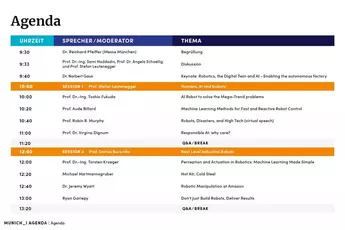intelligence empowering tomorrow - 28. Juni 2023
Als eine der hochkarätigsten Veranstaltungen im Bereich KI und Robotik setzt der munich_i Hightech-Summit seine Erfolgsstory im Rahmen der automatica 2023 fort. Namhafte Branchenpersönlichkeiten diskutieren am zweiten Messetag die wichtigsten Visionen, Innovationen, Erkenntnisse und Theorien. Ihre Intention? Künstliche Intelligenz und Robotik aus verschiedenen gesellschaftsrelevanten Blickwinkeln zu beleuchten – für einen klarsichtigen Blick in unsere Zukunft.
Alle Buchungen erfolgen per Registrierung über unseren Online-Ticketshop – je schneller, desto günstiger.
Interdisziplinär und international – so gestaltet sich die Expertenrunde des munich_i Hightech-Summit 2023 am 28. Juni 2023. Vordenker aus renommierten Unternehmen und verschiedenen wissenschaftlichen Fachrichtungen referieren und diskutieren über die aktuellsten Entwicklungen sowie ihre Auswirkungen auf unsere Wirtschaft, Arbeitswelt, Gesellschaft und Umwelt.
Speaker 2023

Keynote

Session 1: Humans, AI and Robots!

Session 2: Next Level Industrial Robots

Session 3: Quality of Life

Session 4: Strategy and Business



Wie werden sich KI und Robotik weiterentwickeln und welchen – vor allem ethischen – Fragen müssen wir uns dabei stellen? Unter dem Leitmotiv intelligence empowering tomorrow beleuchtet der Summit die Interaktion menschlicher und künstlicher Intelligenz und den verantwortungsvollen technologischen Wandel. munich_i steht unter Schirmherrschaft des Bayerischen Ministerpräsidenten Dr. Markus Söder, der bereits den Hightech-Summit 2022 persönlich eröffnet hatte.
Das Summit-Programm beinhaltet einen geführten Rundgang über die nahegelegene Ausstellung und Dialogplattform AI.Society. Hier lässt sich unmittelbar erleben, wie Robotik und KI in den Bereichen Gesundheit, Mobilität, Arbeit und Umwelt zum Einsatz kommen werden. Ein abschließendes Get-together bietet ideale Möglichkeiten, sich in ungezwungener Atmosphäre zu den inspirierenden Vorträgen und Eindrücken auszutauschen und neue Kontakte zu knüpfen.
Save-the-date: Mittwoch, 28. Juni 2023, von 9:30 – 18:00.
Das Munich Institute of Robotics and Machine Intelligence (MIRMI) bündelt zur Erforschung maschineller Intelligenz die Expertise von 80 Professoren diverser Fachrichtungen der Technischen Universität München (TUM). Daraus rekrutiert sich auch das Team von Wissenschaftlern, das für die Programmgestaltung des munich_i Hightech-Summits 2023 zuständig ist.
Prof. Dr. Alin Albu-Schäffer (Vorsitzender)
DLR - Deutsches Zentrum für Luft- und Raumfahrt: Institut für Robotik und Mechatronik
Prof. Dr. phil. Klaus Bengler
Lehrstuhlinhaber für Ergonomie
Prof. Dr.-Ing. Darius Burschka
Head of the Machine Vision and Perception Group am Lehrstuhl für Robotics, Artificial Intelligence and Real-time Systems
Prof. Dr. habil. Alois Knoll
Lehrstuhlinhaber für Robotics, Artificial Intelligence and Real-time Systems
Prof. Dr. Edward G. Krubasik
Honorarprofessor TUM School of Management
Prof. Dr. Stefan Leutenegger
Lehrstuhlinhaber für Machine Learning for Robotics
Prof. Dr.-Ing. Markus Lienkamp
Professor am Lehrstuhl Mobility Systems Engineering
Prof. Dr. Ruth Müller
Professur für Wissenschafts- und Technologiepolitik
Prof. Dr. Cristina Piazza
Assistenzprofessorin am Lehrstuhl für Anwendungen in der Medizin
Prof. Dr. Angela Schöllig
Lehrstuhlinhaberin für Sicherheit, Performanz und Zuverlässigkeit lernender Systeme
Prof. Dr.-Ing. Eckehard Steinbach
Lehrstuhlinhaber für Medientechnik
Wirtschaftsgrößen und Wissenschaftler aus Europa, Nordamerika und Singapur erörterten wegweisende Lösungen und aktuelle Forschungsergebnisse, die unser Leben nachhaltig verändern werden. Ob Lagerautomatisierung, Deep-Learning-Ansätze für intelligente Roboter und automatisiertes Fahren oder Soft Robotics: Mit vier Sessions und einem Abschluss-Vortrag bot der munich_i Hightech-Summit 2022 seinen rund 200 Teilnehmern aus Forschung und Industrie ein breites Spektrum an Themen und Insights.